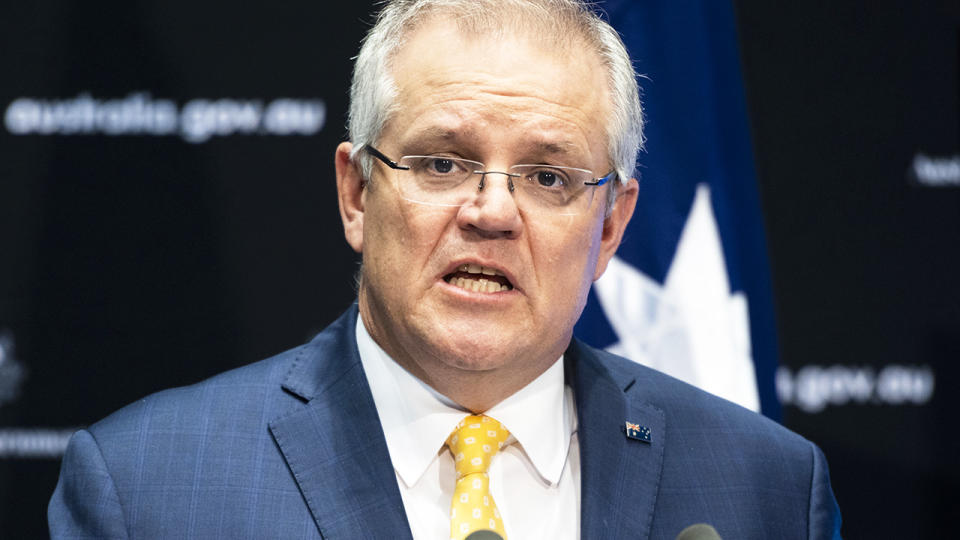'No jab, no play': Scott Morrison urges NRL to ban anti-vaxxers

Scott Morrison has weighed in on the debate around vaccinations for NRL players, suggesting those who refuse to get the flu shot shouldn’t be allowed to play or train.
Controversy has erupted in recent days over reports Gold Coast Titans player Bryce Cartwright refused to get the jab.
‘ROCKS IN THEIR HEAD’: Albury Council savaged over Storm ban
‘NOT A GIVEN’: Channel Nine drops fresh bombshell on NRL
As the NRL moves forward with plans to restart the suspended season on May 28, officials have told players they all need to get the jab before returning to training.
However Cartwright, whose wife is a high-profile opponent of vaccinations, has reportedly refused.
Morrison was asked about the controversy on 2GB radio on Wednesday and suggested players shouldn’t be allowed to play until they’ve had the flu shot.
“When I was social services minister I started the ‘no jab no play’ rule into the childcare facilities and I think the same rule applies there (NRL) - no jab no play,” the Prime Minister said.
Controversy erupts over Cartwright’s stance
The NRL’s biosecurity experts have expressed their belief that players are more susceptible to contracting coronavirus if they get the flu.
However that has posed significant challenges for a number of players who are against vaccinations.
The latest reports suggest Cartwright was allowed to return to training with his Titans teammates after signing a waiver.
But that news has sparked more controversy.
“As for Bryce, I’m sorry but no flu shot, no play,” Panthers legend Mark Geyer told Triple M’s Rush Hour.
“I respect he and his partner’s decision for his family, if they don’t want to get the kids vaccinated that’s fine.
“What I never understand with this type of scenario is if god forbid Bryce or his partner or one of their kids did get coronavirus, and there’s a vaccination made available to us in a month, would you take it?
“I know the Cartwright family pretty well and I’m pretty sure growing up Bryce has had many a flu shot, many vaccinations.
“What he does with his kids is his own business but to play footy, man, you’ve got to have a flu shot brother.”

Cartwright’s wide defends beliefs
Taking to Instagram on Tuesday night, Cartwright’s wife Shanelle addressed the backlash.
“People have the freedom to say what they like, just like we have the freedom to choose which medical procedures we undergo, but ultimately the proof is in the pudding,” she wrote.
“Our kids are a picture of health. They’ve never had an ear infection, never had a chest infection or bronchitis, they have no neuro-developmental disorders or auto-immune disorders and are rarely ever sick.
“They’ve never had a round of antibiotics are any other pharmaceutical drug for that matter (yes, including Panadol). As parents we do our best with what we know, for some, health comes in a needle and it works for them.
“What we’re doing is going seemingly well seeing the state of their health. So if it’s not clear, we’re not anti anything. We stand for medical freedom and the right to choose.”
The Cartwrights caused a stir last year when they first revealed their views, saying they wouldn’t vaccinate their children Koa, 2, and Naia, 1.
Health authorities have previously warned about the dangers of not vaccinating children.
“Immunisation is a safe and effective way to protect you and your children from harmful, contagious diseases,” the Australian government’s health department says.
“It also safeguards the health of other people, now and for future generations.
“Before vaccination campaigns in the 1960s and 1970s, diseases like tetanus, diphtheria, and whooping cough killed thousands of children. Today, it is extremely rare to die from these diseases in Australia.”

